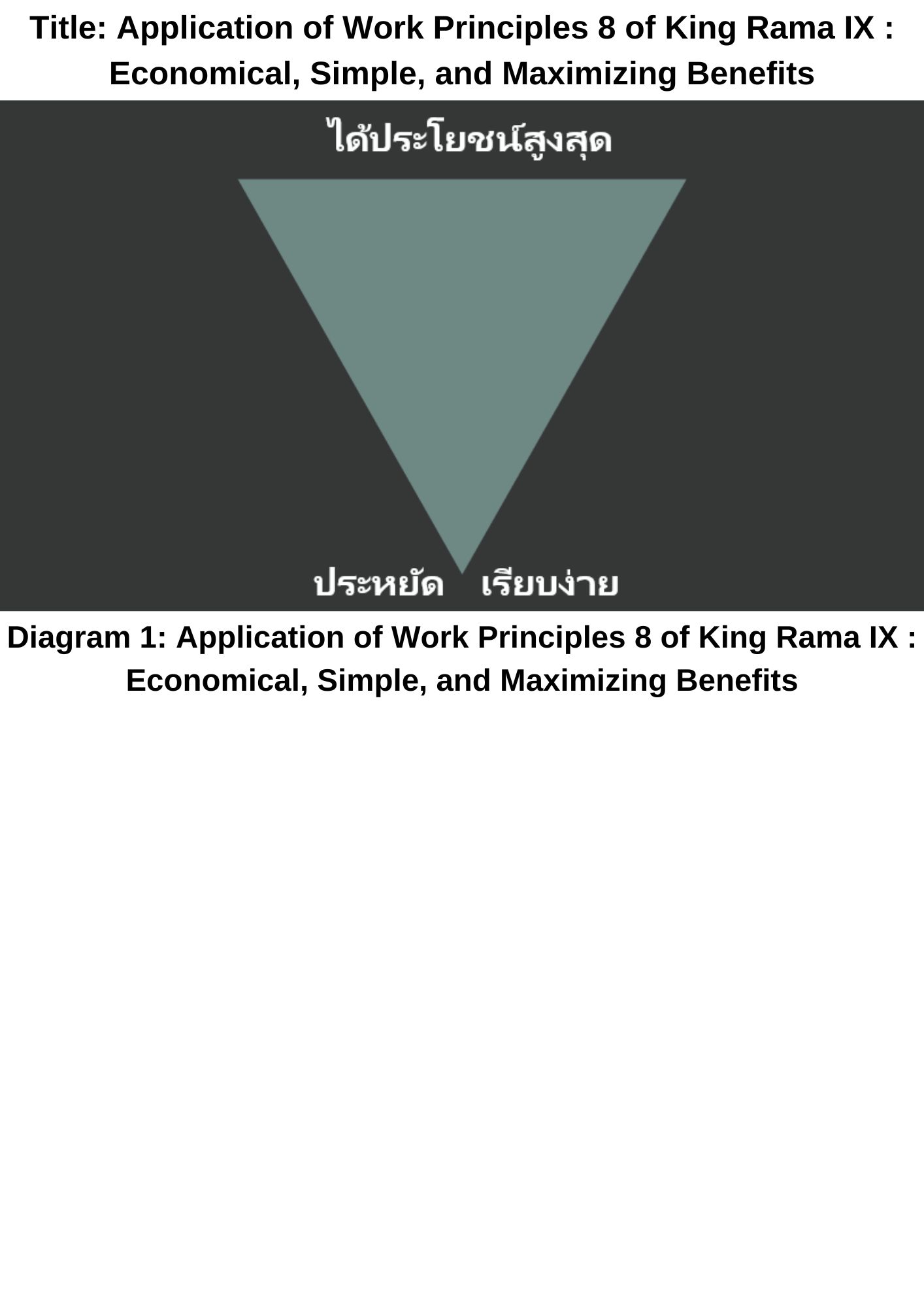Application of Work Principles 8 of King Rama IX : Economical, Simple, and Maximizing Benefits
Keywords:
Application, Work Principles 8 of King Rama IX, Economical, Simple, Maximizing Benefits.Abstract
This academic article aims to study the Application of Work Principles 8 of King Rama IX is Economical, Simple, and Maximizing Benefits. The analysis reveals that "Economy" refers to the appropriate, cost-effective use of resources, avoiding extravagance and unnecessary consumption. Applying the principle of “Economy, Simplicity, and Maximum Benefit” in daily life can be achieved through the following steps: Economy involves planning resource usage and budget management effectively. Simplicity focuses on minimizing complexity, reducing unnecessary steps, and using appropriate tools. Maximum Benefit refers to setting goals and planning resource usage to achieve the highest efficiency, while simultaneously developing processes. To effectively apply the 8th Royal Principle - Economy, Simplicity, and Maximum Benefit-one must consider necessity and cost-effectiveness in all dimensions. This principle uses economy and simplicity as the foundation leading to maximum benefit. In other words, economy and simplicity represent the causes, while maximum benefit is the outcome. This principle can be applied across political, economic, social, and environmental dimensions. New insights gained from the study include the application of the 8th Royal Principle - Economy, Simplicity, and Maximum Benefit. By using “economy” and “simplicity” as the foundation, this leads to achieving “maximum benefit.” This principle can be applied across the dimensions of politics, economy, society, and the environment.
References
ขนิษฐา กาญจนรังสีนนท์, กาญจนา รอดแก้ว, ประไพ ศิวะลีราวิราศ, พรหมพิริยะ พนาสนธิ์, ศยามล ลัคณาสถิต และ รังสรรค์ หังสนาวิน. (2554). รายงานวิจัยฉบับสมบูรณ์โครงการวิจัยประโยชน์สุขจากเศรษฐกิจพอเพียง. รายงานผลการวิจัย. กรุงเทพฯ : สํานักงานกองทุนสนับสนุนการวิจัย.
ชัยโรจน์ นพเฉลิมโรจน์. (2565). การคิดนวัตกรรมด้วยหลักการทรงงานตามหลักปรัชญาหลังนวยุค. วารสารการวิจัยเพื่อพัฒนาชุมชน, 15(2), 111-117
_________. (2565). องค์รวม : การศึกษาเชิงวิเคราะห์ วิจักษ์ และวิธาน. วารสารวิจัยธรรมศึกษา, 5(2), 222-230.
_________. (2567ก). การประยุกต์ใช้หลักการทรงงานข้อที่ 1 : ศึกษาข้อมูลอย่างเป็นระบบ. วารสารสถาบันพอดี, 1(1), 38-53.
_________. (2567ข). การประยุกต์ใช้หลักการทรงงานข้อที่ 2 : ระเบิดจากข้างใน. วารสารสถาบันพอดี, 1(2), 46-60.
_________. (2567ค). การประยุกต์ใช้หลักการทรงงานข้อที่ 3 : แก้ปัญหาที่จุดเล็ก. วารสารสถาบันพอดี, 1(3), 33-40.
_________. (2567ง). การประยุกต์ใช้หลักการทรงงานข้อที่ 4 : ทำตามลำดับขั้น. วารสารสถาบันพอดี, 1(4), 33-44.
_________. (2567จ). การประยุกต์ใช้หลักการทรงงานข้อที่ 5 : ภูมิสังคม. วารสารสถาบันพอดี, 1(5), 30-40.
_________. (2567ฉ). การประยุกต์ใช้หลักการทรงงานข้อที่ 6 : องค์รวม. วารสารสถาบันพอดี, 1(6), 44-57.
_________. (2567ช). การประยุกต์ใช้หลักการทรงงานข้อที่ 7 : ไม่ติดตำรา. วารสารสถาบันพอดี, 1(7), 41-52.
เมธา หริมเทพาธิป. (2559). การศึกษาตามหลักปรัชญาหลังนวยุคนิยมสายกลาง : วิเคราะห์จากหลักการทรงงานของพระบาทสมเด็จพระปรมินทรภูมิพลอดุลเดช. วารสารศึกษาศาสตร์ มมร, 4(1), 120-132.
รัษฎากร ชัยเรืองรัชต์. (2554). การศึกษางานออกแบบที่มีลักษณะเรียบง่าย. วิทยานิพนธ์ปริญญาศิลปมหาบัณฑิต. บัณฑิตวิทยาลัย, มหาวิทยาลัยศิลปากร.
สำนักงานคณะกรรมการพิเศษเพื่อประสานงานโครงการอันเนื่องมาจากพระราชดำริ (สำนักงาน กปร.). (2559). หลักการทรงงานในพระบาทสมเด็จพระเจ้าอยู่หัว. พิมพ์ครั้งที่ 11. กรุงเทพฯ : สำนักงาน กปร.
อภิชัย พันธเสน. (2551). การวิจัยและ พัฒนาเพื่อขับเคลื่อนเศรษฐกิจพอเพียง. คณะบริหารศาสตร์ มหาวิทยาลัยอุบลราชธานี. [ออนไลน์].แหล่งที่มา : http://bsris.swu.ac.th/filenews/53rdbsriapichai.pdf [14 มกราคม2555]
อำนวย แตงรอด. (2540). การเปิดรับข่าวสารการประหยัด ประโยชน์จากข่าวสารกับการซื้อสินค้าฟุ่มเฟือยต่างประเทศในภาวะวิกฤตเศรษฐกิจของวัยรุ่นในกรุงเทพมหานคร. กรุงเทพฯ : จุฬาลงกรณ์มหาวิทยาลัย.

Downloads
Published
How to Cite
Issue
Section
License
Copyright (c) 2024 Institute of Sufficiency Journal

This work is licensed under a Creative Commons Attribution-NonCommercial-NoDerivatives 4.0 International License.



